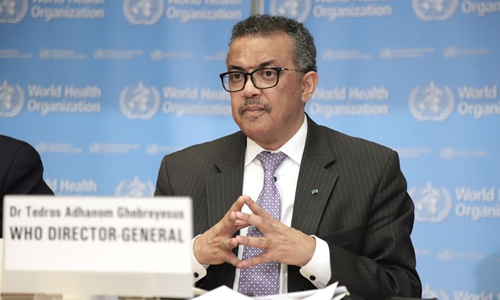Suppressing WHO amid pandemic lack in basic humanity, unacceptable to intl community: Chinese FM
Source:Global Times Published: 2020/5/24 20:13:40

File picture shows World Health Organization (WHO) Director-General Tedros Adhanom Ghebreyesus speaks at a daily briefing in Geneva, Switzerland, on March 9, 2020. (Photo by Li Ye/Xinhua)
The World Health Organization (WHO) has fulfilled its responsibility in the fight against the COVID-19 pandemic very well under the leadership of Director-General Tedros Adhanom Ghebreyesus, and those who smear the WHO will only end up getting themselves dirty, said Chinese State Councilor and Foreign Minister Wang Yi at a press conference on Sunday.
The WHO has played a vital role in coordinating international cooperation in global public health issues, and Ghebreyesus is fully trusted by the international community, Wang said.
Since the COVID-19 outbreak, the WHO, under the leadership of Ghebreyesus, has offered timely, professional advice and performed its obligations well at every key moment, Wang said.
People have a sense of natural justice, and the WHO's international status and historical evaluation will not change due to individual country's preference. Those who throw dirty water on the WHO will end up staining itself, Wang noted.
With 194 sovereign member states, the WHO, cannot serve an individual country and will not yield to the will of a particular country simply because it provides more funding than other member countries.
Suppressing and blackmailing the WHO amid the pandemic shows a lack in basic humanity and cannot be accepted by the international community, Wang said.
Wang also noted that post-pandemic WHO reforms should be aimed at improving multilateralism and supporting the WHO rather than weakening it.
Three key areas of reform are needed: first, rule out the effect of political factors at the institutional and regulatory level and lend greater respect to scientific and professional opinions; second, provide the WHO with more resources to improve its ability to respond to global public health crises; third, invest more in the public health sector in developing countries.
Global Times